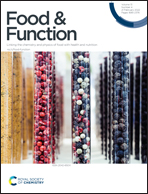A β-N-acetylhexosaminidase Amuc_2109 from Akkermansia muciniphila protects against dextran sulfate sodium-induced colitis in mice by enhancing intestinal barrier and modulating gut microbiota†
Abstract
Inflammatory bowel disease (IBD) is associated with the microbial composition of the gut and its metabolites. Akkermansia muciniphila is a probiotic that exerts a significant alleviative or therapeutic effect on host enteritis. This study was designed to determine the protective effect and potential mechanism underlying the secretion of β-acetylaminohexosidase (Amuc_2109) by A. muciniphila against dextran sulfate sodium (DSS)-induced colitis in mice. C57BL/6 mice were gavaged with Amuc_2109 for 21 days, and during the last seven days of treatment, they drank DSS dissolved in their drinking water to induce colitis. Our results showed that supplementation with Amuc_2109 improved DSS-induced colitis as evidenced by lowered disease activity index (DAI) scores, reduced weight loss, increased colon length, and inhibited oxidative stress. In addition, Amuc_2109 inhibited the overexpression of inflammatory cytokines (TNF-α, IL-1β, IL-6) and the NLR family pyrin domain containing 3 (NLRP3) inflammasome in DSS-induced colitis. Furthermore, supplementation with Amuc_2109 also restored the mRNA expression of tight junction proteins (ZO-1, occludin, claudin-1). Further analysis of fecal microbial 16S rRNA sequences showed that Amuc_2109 reshaped the intestinal microbiota. While the anti-inflammatory effects of Amuc_2109 were only manifested with the wild-type protein, the anti-inflammatory effects were completely lost after the mutation of its key catalytic amino acids rendered Amuc_2109 inactive. In summary, these findings demonstrate the potential of Amuc_2109, as a therapeutic agent for ulcerative colitis. We posit that it will provide additional assistance in the prevention and treatment of mucus layer-related diseases such as ulcerative colitis.



 Please wait while we load your content...
Please wait while we load your content...